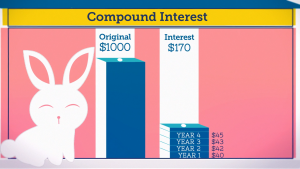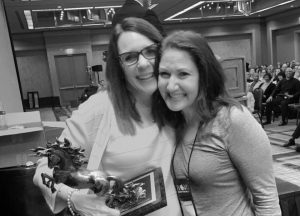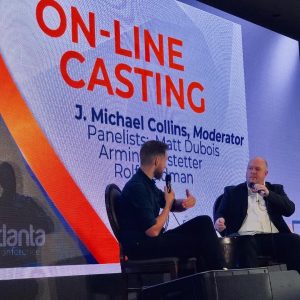Voice actor and coach Angel Burch has had a prolific career in the industry and has helped many new talents find their footing on the road to success. Here, we discuss her struggles in our vocal health series and learn lessons from her story.
JMC: Tell us about how you got started in voiceover
ANGEL: It was a fluke. I did a lot of on-camera work at a young age in Canada, where I grew up. I was working on a film at around 14, and when it wrapped, the director mentioned that they needed a voiceover for the beginning credits. He jokingly asked everyone in the room if anyone could sound like a five-year-old kid. He wanted to complete everything that day. Being the precocious child that I was, I raised my hand and said, “sure, I can do that!” Honestly, up to that point, I had never done voiceover before. The extent of my career encompassed professional singing and on-camera work, and that was it. So they decided to give me a try, and I walked into this small little room with a microphone in the middle. The director fed me the line and I did my best impersonation of a 5-year-old. When it was all said and done, I thought, “This! This is what I want to do for the rest of my life!” I wasn’t even aware that voiceover was a real thing or something I could make a career out of. But I found myself choosing to do work that would encompass using my voice over the years. So I pretty much naturally fell into a 30-year career.
JMC: What did your career look like before you started having vocal health issues?
ANGEL: At the time I started having issues, I had just completed a professional commercial demo with you. Leading up to that point, I was doing eleven characters in an animation series overseas and a couple of educational apps, some e-learning, and had gotten a national commercial. I also did some smaller regional and local things. I had started getting some top-level agent attention as well, which, as you know, if you don’t live in LA or New York, is a really huge thing. So my career was taking off. I couldn’t see myself doing anything else for the rest of my life. Because I was so confident in my career at that point, my husband and I decided to buy a farm and we were really looking forward to enjoying what life was bringing us.
JMC: Can you describe how you first knew there was a problem?
ANGEL: In November 2016, I started having issues with a growl in the lower register of my voice. It would only happen occasionally, and it was right about the time when you and I were doing a demo session together that it started. Because it was so random and didn’t happen that often I thought it was just a phase. I sincerely thought it would pass, that maybe I was just dehydrated because of the weather or stressed because we really wanted to move and couldn’t find a house. I knew that those factors could affect my voice, so I wasn’t overly concerned. But by January, it had gotten considerably worse. The texture in my voice wasn’t just in the lower register anymore it was starting to creep up and into the higher registers and affecting my everyday speaking. I decided I should go and seriously get it checked out by an ENT. They scoped my throat, looked at my vocal cords, and did an assessment but couldn’t find anything really wrong physically. He asked me if I had felt any strain or pain in that area, and I told him that I didn’t feel anything other than having the symptoms of this rough texture coming into my voice and being unable to subdue it to the point of not being able to do my job. The doctor suggested I talk with a speech pathologist if it didn’t get better, but in the meantime, he just attributed it to stress. He told me to relax more and, rest my voice more, drink lots of water. All of the normal things you would do as a first defense. I continued working on the animation series and decided to put everything else aside and focus on that for a while. I thought maybe I was just stressing my voice because I was doing so much work.
By the end of March, My voice started cutting out completely at times. I would be speaking in normal conversation, not even doing a voiceover, and suddenly I would lose my voice in the middle of a sentence or something. I would rest for a little bit, and it would come back. I told the producer of the animation series that I needed to slow down some of the production because they were pushing to get this done. I told him that I felt like it was just a strain on my voice, and to continue, I needed to rest a bit more. But by the end of May, I could hardly talk. I thank the Good Lord that I had spoken to Rob Sciglimpaglia about the contract for the animation series before signing it. Because he told me to place a clause in there regarding illness. Should I not be able to continue at any point during the series that I wouldn’t be punished by forfeiture of any money that I had made or any money that I would make should they decide to go ahead and broadcast what I had already voiced. Because of that clause, I could get out of the contract for the animation series and pursue what was wrong with my voice.
JMC: Tell us how your condition progressed and where you are today
ANGEL: I went to about four doctors over the two-year period, and the only diagnosis I got was mild asthma. They put me on asthma medications, but it didn’t help my voice. Nobody could figure out why my voice wasn’t coming back. I had had a viral infection and a fungal infection at the same time a few months before, and they concluded somehow that combination had affected either my lungs or my vocal cords. But, again, nobody was sure. I was unable to speak much more than above a whisper. I was so frustrated at not being able to communicate that I had started learning sign language just to talk to my husband and my friends. I was even more devastated when I started experiencing mild hearing loss. I was again unable to get a clear diagnosis, but at the same time, I had to believe that God was in control and trust that He knew what He was doing. I had a couple of voiceover students, which I continued with because I wanted to stay in business and be connected, and I knew the more I strained my voice trying to talk the worse it would probably be. I don’t think I ever got super depressed, but I did have low times and spent a lot of time self-reflecting since I couldn’t talk at length to anybody else. It made me stronger because I realized that my self-worth was more than my ability to do voiceover. I delved more into becoming a life coach, and I started taking on some more voiceover students at the encouragement of my friend Everett Oliver. He probably doesn’t realize it, but his encouragement and being his goofy self and calling me out of the blue to shoot the breeze helped me stay positive that things would work out just fine whatever life course I ended up at. I started really pacing myself by using my knowledge in the industry to stay abreast of changes.
The breakthrough came weirdly. This past spring, I got a horrible bout of bronchitis. I have had pneumonia in the past, so we were very concerned since I had trouble breathing and my temperature was high. My husband took me to the emergency room, where they gave me substantial doses of antibiotics, over 1000 mg IV. They sent me home with another 1000 mg to take over the next five days. Within two weeks of that treatment, all of a sudden, my voice came back. It was weak from not being used, but it was there. When I spoke to my doctor about it, he suggested I may have had a low-grade bacterial infection in the ear, nose, and throat area that wasn’t showing up on any of the bloodwork. He suggested I start doing some light vocal exercises and strengthening my voice to see if it stays. I also promised my husband I would give it at least four months before I would say my voice was back completely. So, I didn’t tell anyone for months that my voice had come back at all. I was getting more excited by the minute, seriously overjoyed. The idea that I could communicate with people outside of my family without sign language was almost overwhelming, coupled with the fact that there was a possibility I could go back into voiceover. You have to remember I completely retired from doing voice over because I thought this was a permanent condition that I would not recover from. I sold my mics, and my booth and took down my website.
Today my voice is strong, I have slowly worked to make it stronger, I have brought it back up to full strength enough to do voiceover again on a full-time basis.
JMC: How has it impacted your voiceover business?
ANGEL: Funny you should ask this LOL. When I started back just a few short months ago, I thought I’d jump right in where I left off, and everything would be great; within a few months, my career would be on track again. But that hasn’t been the case. While reaching out to a lot of my former clients, I found that the smaller producers were out of business. They are no longer doing freelance production or moved to larger companies where they’re not the decision-maker regarding hiring voiceover. But always telling me, they were put in a good word, which is sweet. The larger companies that I worked for put me back on their rosters, but of course, it’s a typically a slow time for voiceover anyway, so really my focus has been on developing and teaching my business and marketing class. I am also working on different Marketing tactics to help bring in new business. I have been working on getting my studio to perfection, speaking with friends in the industry who are experts in that field, and I’m trying to do my business differently this time around. I’m taking my time, I’m not rushing into things, I am doing small jobs here and there but I’m not at the point where I’m pursuing those long-form e-learning or the medical narrations, or the Six Sigma stuff again LOL. I’m giving myself time to develop good healthy marketing strategies, good healthy business practices, and good healthy voice techniques. I’m moving in a better direction now than where I was previously. I’m in a better headspace, and I’m working smarter. My coaching has been going like gangbusters, especially with my husband’s introduction of the X-Class business and marketing series. And I love working with him in this business. We had a business for over twenty-five years together, so I am bringing that knowledge and insight to voiceover now with him, and it is like a dream come true.
JMC: What advice would you give to other talents who are experiencing vocal issues?
ANGEL: Wow, so many things are going through my mind with this question. First, if you have vocal problems, try to find out why. Rest your voice, don’t force things, and even more so than that, rest your mind. It can be so devastating not to be able to communicate in a way that you’re used to, and You need to take the time to be good to yourself. Discouragement and frustration is going to come — let it come, but be smart and not self-deprecating. Sometimes things just happen, and if you can use the time of healing your voice to also strengthen who you are mentally, then if and when you do recover your voice, you will be in a much better place.
Stop trying to overthink, or rethink what you could or could not have done to make things better or work for you. Now is the time to reflect on your options outside of a voiceover career. Should it come to that, you need to be prepared for that outcome. I wasn’t ready for that, so I floundered for the first year aimlessly, not knowing what to do with myself. If you have a clear direction of where you want to go should you not be able to continue in voiceover, then I think that it’s healthier. I would also give that advice to those who are currently in voiceover: Have a backup plan. What happened to me was sudden. Within four months I lost a six-figure income. It was such a strain on us financially, so that put more of a strain on me mentally. When you are sick, you don’t need more stress.
And lastly, the best advice I could give anyone going through a devastating illness is to seek out the support of those closest to you. Whether it be family or friends, you need physical, in real life, people who will rally around you. People who will not only encourage you but give you that kick in the butt when you need to get up and just move when you can’t. Online friends are fine, but I had to distance myself from my social media during that time because I couldn’t move on as long as I was in that world. It wasn’t until I accepted the support from my family and friends that I could finally find a place where I could heal. Take care of your voice, drink lots of water, and get lots of rest. Honestly, a couple of the big things now that affect my voice are lack of sleep and being in air-conditioning. I live in the south in extreme heat, so air conditioning is vital. However, it’s also detrimental to my voice because it dries out my throat no matter how much water I drink. So I have to be careful not to be directly in front of an air conditioner in the car or the house.
Besides that, look in the mirror every morning and be good to yourself. You deserve it. You are never a failure If you’re doing what you love and doing your best at it. In my mind, that makes you a success.










